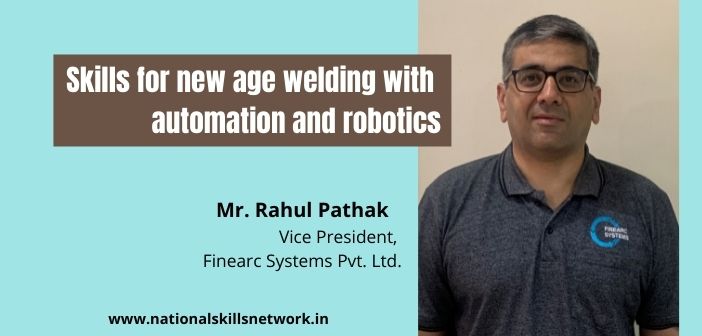
“Automation and robotics will not take away the jobs of welders. With right skills and skill upgradation, there isn’t such a threat”, says Mr. Rahul Pathak, Vice-President, Finearc System Pvt. Ltd., Pune, Maharashtra.
Welding automation and robotics increase the performance of the production of welds. It improves and increases the speed, precision, quality and also minimizes the chance of errors or inconsistent welds.
With new-age welding technologies, the skill requirements have also evolved over the years. To understand some of the skills, the impact of automation and robotics on welding, adoption of new technologies by the MSME sector, among others, we conversed with Mr. Rahul Pathak, Vice-President, Finearc System Pvt. Ltd., Pune, Maharashtra.
Below are a few excerpts from our conversation, facilitated by Fronius India. You can watch the full video on our YouTube channel, where he also talks about their long-term association with Fronius India.
Q: Please tell us about your association with Fronius?
A: Our association with Fronius is over several years now. We have worked on multiple projects together. We delivered a big line of products for the BS-VI programme to a top-end industry manufacturer that is responsible for making the entire BS-VI compliant commercial vehicle engines. Fronius makes top-end equipment and we use their products in the solutions we offer to our customers. Fronius has been a reliable partner in delivering technology projects.
Q: How do you think automation and robotics are impacting welding?
A: Finearc Systems Pvt. Ltd. has been in the welding business for more than 30 years now. Since then, we have seen how automation has started with hard and custom automation. Now, the focus has shifted towards flexible automation. This is where robotics comes into the picture. Robotics is widely accepted and used in the Indian industry for the past several years. We must understand that robots are here to stay and they are the future.
Robotics is an amalgamation of many technologies. Thousands of robots are used on a yearly basis in India and that is heavily impacting the way welding is done. So, there is no choice for Indian manufacturing and automation industries but to adopt robotic welding technology. There are multiple reasons to adopt automation, like top-quality welds, productivity, consistency and repeatability, etc. which we cannot expect from a human.
But, one of the challenges in adopting automation and robotics is finding skilled labour who have the skills of automation and robotic welding. Students need to know different areas of operations in technology.
Q: How did welding skill requirements change over the years with new technologies?
A: When we think of welding, one usually thinks of a roadside shop, sparks coming from the work done or of a person who repairs a car or a bike. But welding has changed and evolved so much now!
Welding is used across various industries from the manufacturing industry to shipbuilding. Right from the mobiles we use, to cars we travel in and the pressure cooker we use for cooking, are all made with welding.
With new welding technologies, skill requirement has also evolved. Some of the skills required by the new trainees or the students in welding are:
- Basic welding knowledge
In colleges or institutions, welding is taught in terms of small projects or as part of one of the semesters. But that is not enough for the industry. Therefore, if students are interested, they can do multiple courses in welding and specialize in their field of interest.
- Knowledge of automation
One must know and have knowledge of robots and robot technology. Students must be aware of automation, programmable logic controller, and other technologies involved in the process. One should be aware of the whole system and process to deliver top-end solutions.
With these latest skills, one can become Robotics? Engineer, PLC Engineer, Mechanical Engineer, etc. among others.

Q: How do you ensure that your employees are adequately trained? How do you think you can extend this to other companies?
A: Our customers are driving our training process. The welding industry is very big and the requirements keep changing. If a customer wants a project which requires new or different technologies, we adopt those and train our employees/ trainees in it.
We train our people in different skills. If one is doing Metal Inert Gas (MIG) welding, there are different sub-processes, and they are trained in all of those. We also send our trainees and employees to welding institutes, ITIs, and to Fronius for training.
Q: How can the MSME sector adopt the latest technologies in welding?
A: MSMEs are already adopting the latest technologies. MSMEs have a dearth of skilled welders and they prefer automation. Basic welding knowledge is required in every MSME to be able to adapt to the automation in welding.
The direct advantage of adopting automation in welding is productivity, quality, consistency, and repeatability. There are also hard advantages like avoiding any technical issues, where there will be less rejection and quality-related issues.
We have many MSME customers. We train their welders and upgrade them as per the requirements. Welders are usually scared that automation and robotics might take away their jobs. But the reality is, if they upgrade and harness their skills for automation, there isn’t such a threat. They need to learn and adapt to new technologies to be able to grow with the organisation.
They can elevate themselves from being called a blue-collar welder to a Welding Engineer or Robotic? Engineer or Automation Engineer.
Also read: How Big Data is becoming an integral part of welding technologies – https://nationalskillsnetwork.in/how-big-data-is-becoming-an-integral-part-of-welding-technologies/
Q: We see many women picking up welding as a profession. What do you have to say about this?
A: There is nothing in the welding industry that a woman cannot do. If a man can weld, a woman can weld too. There is no limitation for any job role in welding and women can take up any role they feel like. We have women staff for programming in robotics and other areas too. It is heartening to see them take up such roles.













